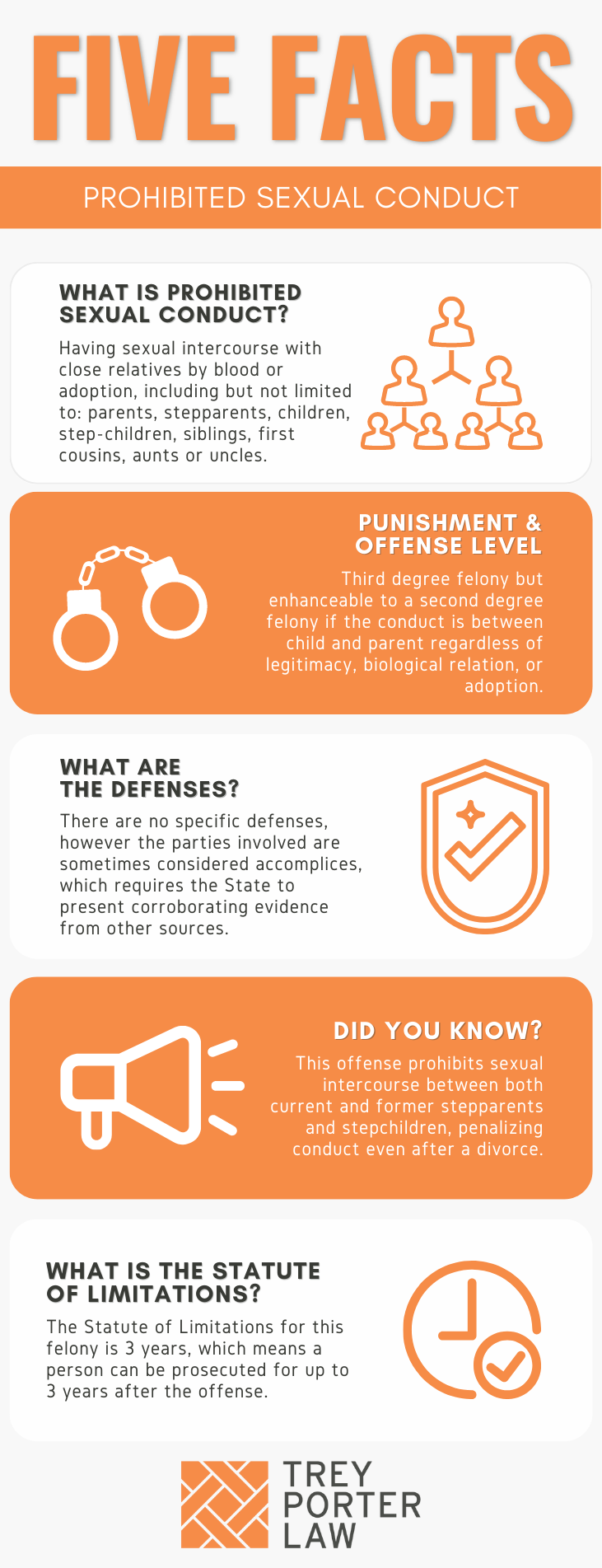WHAT IS PROHIBITED SEXUAL CONDUCT IN TEXAS?
The law against prohibited sexual conduct is the Texas law against incest, which prohibits sexual intimacy between relatives within the first degree of consanguinity or affinity.

WHAT IS THE PROHIBITED SEXUAL CONDUCT LAW IN TEXAS?
Tex. Penal Code § 25.02. PROHIBITED SEXUAL CONDUCT.
(a) A person commits an offense if the person engages in sexual intercourse or deviate sexual intercourse with another person the actor knows to be, without regard to legitimacy:
(1) the actor’s ancestor or descendant by blood or adoption;
(2) the actor’s current or former stepchild or stepparent;
(3) the actor’s parent’s brother or sister of the whole or half blood;
(4) the actor’s brother or sister of the whole or half blood or by adoption;
(5) the children of the actor’s brother or sister of the whole or half blood or by adoption; or
(6) the son or daughter of the actor’s aunt or uncle of the whole or half blood or by adoption.
. . .
(c) An offense under this section is a felony of the third degree, unless the offense is committed under Subsection (a)(1), in which event the offense is a felony of the second degree.
WHAT IS THE PENALTY CLASS FOR PROHIBITED SEXUAL CONDUCT IN TEXAS?
Prohibited sexual conduct is a third degree felony, punishable by two to ten years in prison.
It becomes a second degree felony, punishable by two to 20 years in prison, if the sexual conduct is between a parent and a child, regardless of whether the child is biologically related to the parent or adopted.
WHAT IS THE PUNISHMENT RANGE FOR PROHIBITED SEXUAL CONDUCT IN TEXAS?
The punishment range for prohibited sexual conduct charged as a third degree felony is two to ten years in prison, and a maximum $10,000 fine.
If prohibited sexual conduct is charged as a second degree felony, the punishment range is between two and 20 years’ confinement, and a maximum $10,000 fine.
WHAT ARE THE PENALTIES FOR PROHIBITED SEXUAL CONDUCT IN TEXAS?
A person charged with prohibited sexual conduct may be eligible for probation after a conviction, or deferred adjudication without a conviction, for a period of up to ten years.
However, pursuant to Texas Code of Criminal Procedure article 42A.054, if the person committed burglary of a habitation with the intent to commit prohibited sexual conduct, the person may not receive probation from a judge.
WHAT ARE THE DEFENSES TO PROHIBITED SEXUAL CONDUCT IN TEXAS?
The statute does not authorize specific defenses to prohibited sexual conduct. A person accused thereof may attempt to negate at least one of the elements the State must prove at trial. For example, an accused may argue he or she lacked the requisite knowledge or intent to commit the offense.
- What if the incestual relationship is consensual? Prohibited sexual conduct specifically outlaws incest, not rape, so the State is not required to prove lack of consent. Even if a person is in a consensual relationship with a first cousin, adult stepchild, aunt or uncle, or adult niece or nephew, it is a violation of this law.However, a defendant may show that the other consented, and was thus an accomplice. A person may not be convicted upon the testimony of an accomplice unless corroborated by independent evidence tending to connect the defendant with the offense committed. See, e.g., Tucker v. State, No. 05-19-01515-CR, *7 (Tex. App.—Dallas May 18, 2022, pet. ref’d.).
WHAT IS THE STATUTE OF LIMITATIONS FOR PROHIBITED SEXUAL CONDUCT IN TEXAS?
The limitation period for prohibited sexual conduct is three years.
PROHIBITED SEXUAL CONDUCT IN TEXAS
Texas law prohibits sexual intimacy between relatives within the first degree of consanguinity or affinity. Immediate family members, including first cousins, step-parents, and step-children, are prohibited from having sex with one another. Sexual relationships between second cousins, however, are not criminalized by this statute.
TEXAS PROHIBITED SEXUAL CONDUCT COURT CASES
The case law regarding prohibited sexual conduct in Texas consists of a wide variety of cases involving both consensual and non-consensual sex between relatives. When defendants have sex with their underage children, they may be convicted of crimes in addition to prohibited sexual conduct, such as sexual assault of a child.
The State may decide to prosecute people for prohibited sexual conduct because there are fewer elements to prove.
- In Phelps v. State, the defendant began sexually assaulting his daughter when she was six years old, who did not report the years of abuse until she was nineteen and had moved out. She could not count how many times the defendant sexually assaulted her, and eventually stopped trying to fight him off of her. Lack of consent, however, was not an element the State had to prove to get a guilty verdict. The jury found the defendant guilty of prohibited sexual conduct, and the appellate court affirmed.
The State may also charge a person with prohibited sexual conduct when there are potential issues proving a sexual assault.
- In Biggins v. State, a defendant was caught having sex with his 19-year-old daughter. According to the first responding officer, the victim appeared scared and was crying. She told the officers that she tried to stop her father, but he nevertheless penetrated her. The victim did not testify at trial, but even without her testimony, the State was able to prove the defendant had sex with his daughter. The jury found the defendant guilty of prohibited sexual conduct, and the appellate court affirmed.
















